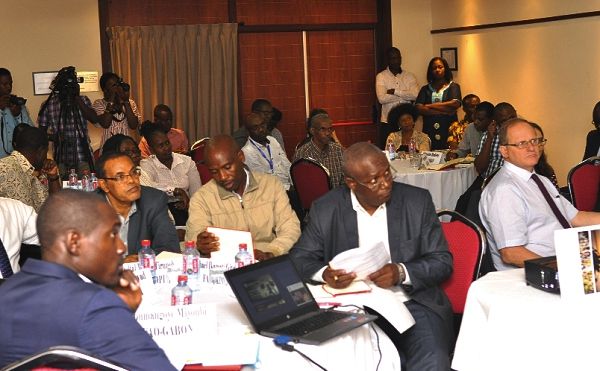Thirty land and water officers from African sub-regional and country offices of the Food and Agriculture Organisation (FAO) are attending a workshop in Accra to increase their know-how in solar-powered irrigation systems (SPIS) for them to help with the increased deployment of irrigation schemes in their respective areas.
The four-day training workshop has thus been designed to provide the participants with information on SPIS, as well as the needed technical skills on solar systems, solar pump for irrigation, sustainability of renewable energy solutions, financing and maintenance to improve farming in the countries where the FAO works.
Participants will also be brought abreast of the priorities and roles of the FAO Land and Water Division, such as the efforts being made to eliminate hunger, food insecurity and malnutrition in Africa.
A comprehensive toolbox on SPIS, developed by the FAO and GIZ, will be used to train the participants on irrigation management and sustainability.
The training is being supported by GIZ, the German technical cooperation agency.
Workshop
Opening the training session in Accra yesterday, a Senior Water Development and Management Officer at the FAO Regional Office for Africa, Mr Valere Nzeyimana, said the workshop was to create the platform for the participants to also exchange ideas, experiences and challenges surrounding water projects that were relevant to the use of SPIS.
He explained that although some of its officers were highly qualified in the use of solar-powered technologies, others had little understanding, while some were not ready to develop, implement and monitor SPIS-related projects, hence the need to build their capacities.
Clean energy
Describing solar irrigation as a reliable, clean-energy solution for agricultural water management, Mr Nzeyimana said “the SPIS technologies had become a viable option for many farmers, especially in rural areas that lacked reliable access to electricity grids or fuel”.
“However, the technology comes along with some challenges, such as access to maintenance services, biophysical and climatic suitability and the lack of technical skills,” he added.
Solar technology
The Assistant Director-General and Regional Representative for Africa at the FAO, Mr Abebe Haile-Gabriel, reiterated the need for the capacities of the land and water officers to be built to enable them to address the challenges that came with the use of solar energy.
He said there was a rising energy demand in agriculture, of which solar energy was becoming affordable, hence the need to adopt its use.
“After this training, participants will be able to provide hands-on guidance for different stakeholders and policy makers in the use of SPIS,” Mr Haile-Gabriel said.
He also expressed optimism that the training would enable the participants to develop the ability to design and operate pumping systems that utilised solar energy and assess how solar-powered irrigation could be feasible and applicable in different contexts.
Technical skills
The Director of the Land and Water Division, FAO Headquarters, Mr Eduardo Mansur, said good strategies were needed to effectively utilise the solar technology in agriculture.
He said the training would provide specific technical skills that were often not available among government officials and technical staff.
A resource person from the International Water Management Institute, West Africa, Dr Olufunke Cofie, said the training would not only provide education and technical skills for the participants but also equip them in a way that would enable them to support their respective countries in developing policies for irrigation projects.

